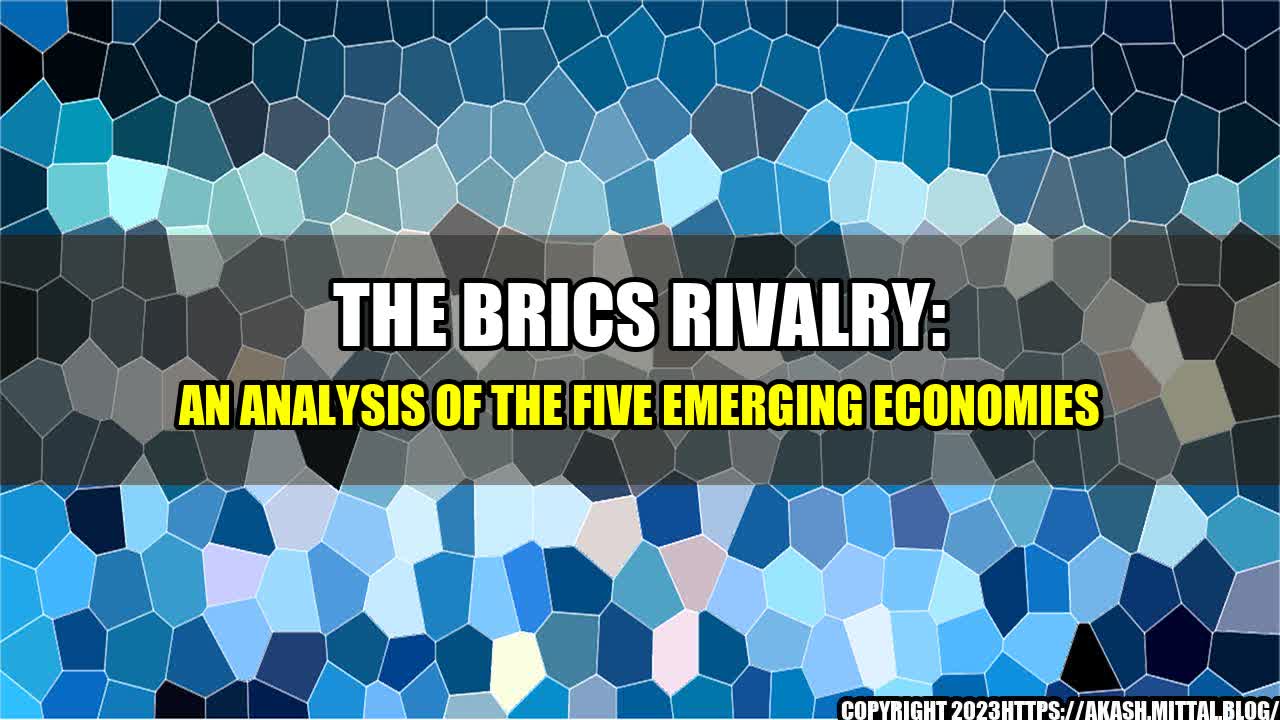
Once upon a time, there were five rising powers in the world: Brazil, Russia, India, China, and South Africa. They formed an alliance that came to be known as the BRICS. With their massive populations, vast territories, and abundant natural resources, the BRICS were predicted to dominate the world economy and challenge the dominance of the Western powers. However, as time passed, it became clear that the BRICS' ambitions were not as united as they seemed. In this article, we will analyze the BRICS rivalry and its implications for the global economy.
The BRICS are often considered a group because of their similar economic structures and demographics. However, there are significant differences between these countries that make their relationships complicated. Here are some quantifiable examples:
The BRICS were initially united by their common goal of challenging the Western powers' dominance and reforming the global economic order. However, as their economies developed, their interests started to diverge, and rivalries emerged. The following are some of the BRICS' conflicts:
China and India have a long-standing border dispute over the region of Aksai Chin and Arunachal Pradesh. The two countries fought a brief war in 1962, and tensions have flared up periodically since then. India has also expressed concerns over China's growing influence in Nepal, Sri Lanka, and the Maldives, traditional Indian allies.
China has also had territorial disputes with other BRICS countries, such as Russia over the Amur River and Vladivostok, and with South Africa over mining rights in the Northern Cape.
China's rise as an economic power has caused concerns in the other BRICS countries, who fear the competition. Indian companies, in particular, have complained about cheap Chinese imports flooding their markets and undercutting their products.
Brazil and Russia, which are heavily dependent on exports of commodities such as oil, gas, and minerals, have been hurt by China's slowdown in demand for these commodities. Russia has also been affected by Western economic sanctions, which have reduced its access to international markets and technology.
The BRICS have also been divided by their political systems and foreign policies. Russia and China have been accused of violating human rights and challenging democratic norms, while India and Brazil have a more favorable image in the West. India and South Africa are members of the Commonwealth, which has strained their relations with Russia over the Ukraine conflict.
The BRICS' rivalry has important implications for the global economy. Here are three points to consider:
The BRICS' inability to present a united front has weakened their influence over global economic governance. While China has been able to assert its agenda through institutions such as the Shanghai Cooperation Organization and the Asian Infrastructure Investment Bank, the other BRICS countries have had less success in pushing for their priorities.
The BRICS were often seen as a potential counterbalance to the Western powers' dominance of the global economy and politics. However, their rivalry and internal conflicts have shown that they cannot provide a coherent alternative to the Western-led order. While the BRICS may challenge certain aspects of the Western model, such as the dominance of the US dollar or the World Bank and the IMF, they have not presented a clear vision of what a new order would look like.
The BRICS' rivalry may provide an opportunity for the US to strengthen its alliances and relationships in the region. While the US has had a checkered history with some of the BRICS countries, such as Russia and China, it has also built closer ties with India and Brazil. The US can also use its leverage as the world's largest economy and a dominant player in global institutions to constrain the BRICS' ambitions and prevent them from challenging the Western-led order.
The BRICS were once hailed as the rising powers that would reshape the global economic order. However, their rivalry and internal conflicts have shown that they are far from united. While the BRICS may continue to challenge certain aspects of the Western-led order, they have not presented a coherent alternative to it. The US, as the dominant player, may use this opportunity to strengthen its relationships and constrain the BRICS' ambitions.
Economics/International Relations
Curated by Team Akash.Mittal.Blog
Share on Twitter Share on LinkedIn